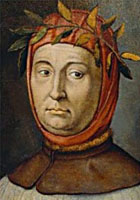The time to labour, for every animal Poem by Francesco Petrarch
The time to labour, for every animal
‘A qualunque animale alberga in terra,' (Sestina)
The time to labour, for every animal
that inhabits earth, is when it is still day,
except for those to whom the sun is hateful:
but then when heaven sets fire to its stars,
some turn for home and some nestle in the woods
to find some rest before the dawn.
And I may not cease to sigh with the sun,
from when dawn begins to scatter
the shadows from around the Earth,
waking the animals in every woodland:
yet when I see the flaming of the stars
I go weeping, and desire the day.
When the evening drives out daylight's clarity,
and our shadow makes another's dawn,
I gaze pensively at cruel stars,
that have created me of sentient earth:
and I curse the day I saw the sun,
that makes me in aspect like a wild man of the woods.
I do not think that any creature so harsh
grazed the woods, either by night or day,
as she, through whom I weep in sun or shade:
and I am not wearied by first sleep or dawn:
for though I am mortal body of this earth,
my fixed desire comes from the stars.
Might I see pity in her, for one day,
before I return to you, bright stars,
or turning back into cherished woodland,
leave my body changed to dry earth,
it would restore many years, and before dawn
enrich me at the setting of the sun.
May I be with her when the sun departs,
and seen by no one but the stars,
for one sole night, and may there be no dawn:
and may she not be changed to green woodland,
issuing from my arms, as on the day
when Apollo pursued her down here on earth.
But I will be beneath the wood's dry earth,
and daylight will be full of little stars,
before the sun achieves so sweet a dawn.
Note. Apollo pursued Daphne who was transformed
into a laurel bough, a play on Laura's name.
Translated by: A. S. Kline
This poem has not been translated into any other language yet.
I would like to translate this poem